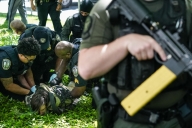You have /5 articles left.
Sign up for a free account or log in.

Nuthawut Somsuk/iStock/Getty Images Plus
Right now, many college and university presidents are probably wondering whether they could be the next Liz Magill or Claudine Gay. Both were pressured to resign in the wake of backlash regarding their testimony before the U.S. Congress about the rise of antisemitic behavior on campuses. Magill resigned as president of the University of Pennsylvania shortly after the hearing last month. Gay, who also faced questions about her academic record, stepped down as Harvard University’s president on Tuesday.
Their swift downfalls serve as a cautionary tale for the perils of poor communications, and they are a reminder of why every president should make communications as much of a priority as enrollment, fundraising and research.
Too often, presidents bump communications down to the lower end of their cabinet’s priorities, and in some cases, they don’t make their chief communications and marketing officer a direct report. Instead the position reports through advancement, government affairs or enrollment.
Yet the chief communications officer should be among the president’s most trusted advisers—and if you are a president, the person you choose for the position matters. Your chief communications officer will often be your bulletproof vest in a crisis. If you choose wisely, you will have someone who has been in the trenches, who understands how stories play out and who will be able to give you the best advice.
The challenge for many presidents is whether they want that advice and are willing to create an environment where they welcome it. Too many presidents reward vice presidents who simply validate their opinions. This role should not be that way. When you are on a sinking ship, you don’t want someone telling you that you’re a great captain. You want someone to show you where the life rafts are.
Let’s be clear: bad things happen on university campuses. But you can minimize the risks. Here are a few ways that presidents can better protect themselves and their institutions.
- Hire a communicator first, not a marketer. Hiring is never easy. Some people look great on paper and interview well, yet they end up being terrible hires. Others have a hard time selling themselves but can be tremendous if given a chance. You never know until they are in the role.
Having said that, presidents often hire poorly because they don’t know what to look for in a vice president for communications and marketing. Most searches focus too much on marketing and not enough on communications. I have heard some presidents even say they need to hire a top cheerleader for the university.
To be clear, marketing is important for a university and certainly among the skills that the role should include. But the job is primarily about advancing and protecting the university’s reputation. It takes years to build a reputation and just minutes to destroy one. To quote legendary football coach Paul “Bear” Bryant: offense sells tickets, but defense wins championships.
The top skill that you should be looking for is experience dealing with issues and crises. Ask them to describe a crisis they dealt with. Ask them to give you an example of an issue they helped manage that could have become a crisis. Ask how they interacted with their previous president or chief executive officer and how often they disagreed with their boss or others in the room. A great vice president of communications has been in enough situations to know how things will play out. They know when to respond and when to stay quiet. And they will have examples to share when you speak with them.
- Don’t hire someone who thinks like you. No one ever admits to wanting yes-men and -women, but too often that’s whom we hire. We all want people who validate our beliefs. Communications should not be the place for that.
A president should look for someone who challenges them. Someone who is confident in their abilities and not afraid to question anyone in the room, albeit respectfully.
One of the reasons that some reporters make great communicators is that they are used to speaking truth to power. They don’t just understand media—they also understand people and perceptions. They are most interested in finding out who knew what and when, which is usually the best way to dissect an issue before seeking a solution.
They are also advocates for transparency, which is where many presidents make missteps. Many presidents, or members of their cabinets, think they can avoid talking about an issue or hide a problem. Some even think you can persuade a reporter to not write a story. That is usually the top reason issues become crises—you can wait too long to share what’s happening, and then when it comes out, people realize that, in fact, you knew about it and did nothing.
- Resist the urge to be the smartest person in the room. This one is tough for many people who work in higher education. Campuses are filled with lots of intelligent people—people who spend their days researching, thinking, ideating and innovating. Unfortunately, when you put lots of smart people together, you also get a tremendous amount of ego. The one place that absolutely doesn’t belong is in the conference room during a crisis.
The best college and university presidents operate like the best CEOs. They are confident enough in their abilities that they use that time to ask questions and create an environment where people feel comfortable sharing unpopular opinions.
- Listen to many voices, but make clear who has a vote. The biggest challenge I noticed when I transitioned from being a journalist to a university communicator was how many people had to weigh in on a simple decision before the president was ready to act. Too often, we struggled to send a simple but urgent message to our community because every cabinet officer had to have their say.
In higher education, that’s known as the voice and the vote. Many people get to have input. Only a few make decisions. Good presidents know that their communications chief should have a larger role during a crisis than most of the other cabinet officers. But not all make that clear.
It is certainly important to get input from people, and that is a luxury that presidents have when they know about something early. When something is an issue, they have time to discuss and debate. Once it reaches a crisis point, however, you’ve lost that time. Nothing slows down a response more than bringing a tough decision to a committee.
- Plan for the worst. It’s very difficult to predict when a crisis will strike and how it will affect an institution. One step that all colleges and universities can take ahead of time, however, is to develop a reputational risk strategy and ensure everyone in leadership is aware of it. It outlines what types of crises typically threaten the institution, who should be contacted when issues develop, who is on your crisis management team and what might prompt the team to escalate the issue to the leadership team. The goal of a reputational risk strategy is to communicate quickly and effectively so that issues don’t become crises.
It is naïve to think that presidents can avoid crises from happening on their campuses. But by hiring well, laying the foundation with thoughtful processes and creating an environment where everyone is prepared, they can greatly reduce any hits that come when crises strike.








